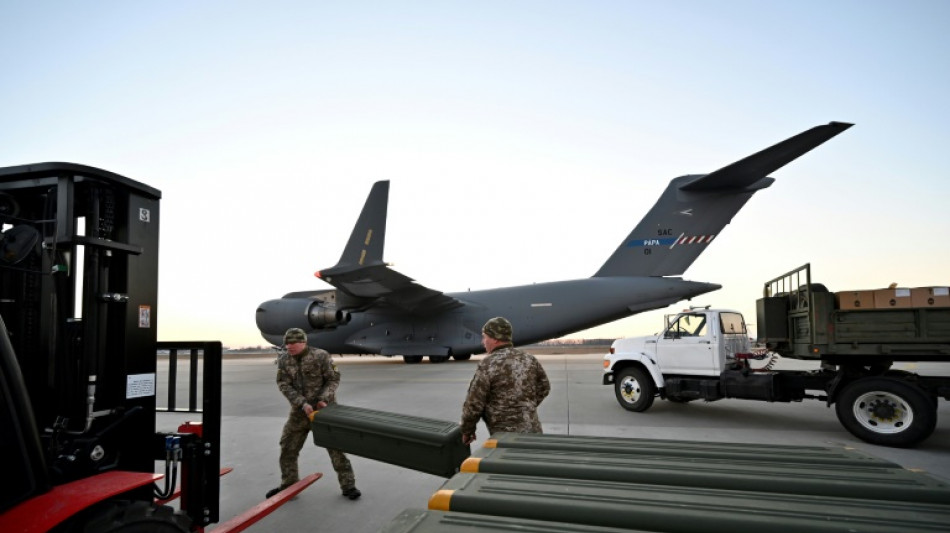
SCS
0.0200


German Chancellor Olaf Scholz lands in Kyiv on Monday before visiting Moscow to try to head off a "very critical" threat of a Russian invasion that would spark the worst crisis in Europe since the Cold War.
Scholz's visit comes with Kyiv seeking an urgent meeting with Russia explaining why it has deployed more than 100,000 soldiers to Ukraine's borders while arguing with NATO about its post-Soviet expansion into countries once under the Kremlin's domain.
The West has remained united and defiant in the face of Putin's demands for binding security guarantees that would see the US-led defence alliance roll back its forces and rule out Ukraine's potential membership.
But US intelligence officials worry that weeks of crisis talks have given Russia the time to prepare a major offensive -- should Putin make the ultimate decision to attack Ukraine.
"We are digging trenches that Ukrainian soldiers could quickly jump into and defend in case the Russians attack," 15-year old Mykhailo Anopa told AFP near front lines separating Kyiv-held territory from that under the control of Moscow-backed insurgents in the separatist east.
- Ukraine demands answers -
Washington reaffirmed its warning Sunday that Russia was now ready to strike at "any moment" with an assault that would likely start with "a significant barrage of missiles and bomb attacks".
Ukraine requested a formal meeting with Moscow and members of the OSCE pan-European security body "explaining the reinforcement and movement of Russian forces along our border".
Scholz also tweeted before flying to Kyiv that Germany was "demanding immediate signs of deescalation" from Russia.
The White House said US President Joe Bident and Ukrainian leader Volodymyr Zelensky agreed in a call Sunday "on the importance of continuing to pursue diplomacy and deterrence".
The Ukrainian presidency said Zelensky had also urged Biden to visit Kyiv "in the coming days" in a show of moral support.
The White House made no mention of the invitation in its readout of the 50-minute call. The United States on Saturday ordered all non-emergency staff to leave its embassy in Kyiv.
Germany's Scholz sounded firm in his resolve to support Ukraine and hit Russia "immediately" with punishing sanctions if it went to war.
"We assess the situation as very critical, very dangerous," a German government source added.
- Tough trip -
Germany plays a central role in mediation efforts around the gruelling conflict in Ukraine's Russian-backed separatist east that has claimed more than 14,000 lives.
But Germany's close business relations with Moscow and heavy reliance on Russian natural gas imports have been a source of lingering concern for Kyiv's pro-Western leaders as well as Biden's team.
Scholz has warned Russia it should "not underestimate our unity and determination" but also hedged against unequivocally backing Biden's pledge to "bring an end" to Russia's new Nord Stream 2 gas link to Germany.
Kyiv is also upset with Berlin for not having joined some of its NATO allies in beginning to supply weapons to Ukraine.
Ukraine's Berlin ambassador Andriy Melnik fumed at "German hypocrisy" in a tweet Sunday mentioning that Germany was exporting "dual-use goods to Russia" but offering "no weapons for Ukraine's self-defence".
Scholz's visit to Moscow on Tuesday also follows tit-for-tat closures of the German-language channel of Russia's RT network and the Moscow bureau of Germany's Deutsche Welle.
- Air travel worries -
Despite the diplomatic push a growing number of Western countries are withdrawing staff from their Kyiv embassies and urging their citizens to immediately leave.
But departures may be complicated by the looming threat of the skies over Ukraine closing due to rising risks for airlines.
Dutch carrier KLM became the first major airline over the weekend to suspend flights to Kyiv indefinitely.
Ukraine's budget airline SkyUp said its flight from Portugal to Kyiv was forced to land in Moldova on Sunday after the plane's Irish leasing company revoked permission for it to cross into Ukraine.
SkyUp said European leasing companies were demanding that Ukrainian airlines return their planes to EU airspace within 48 hours.
Industry analysts believe other international airlines may soon also ban flights into Ukraine because of the growing cost to insurers.
The travel industry is still haunted by the memory of Malaysia Airlines flight MH17, shot down while flying near eastern Ukraine's conflict zone in July 2014.
All 298 passengers and crew on board the Amsterdam-Kuala Lumpur flight were killed.
The diplomatic drawdown has also touched the staff of the Organization for Security and Co-operation (OSCE) monitoring mission in Ukraine.
The mission said "certain participating states" had asked their staff to leave Ukraine "within the next days".
C.M.Harper--TFWP